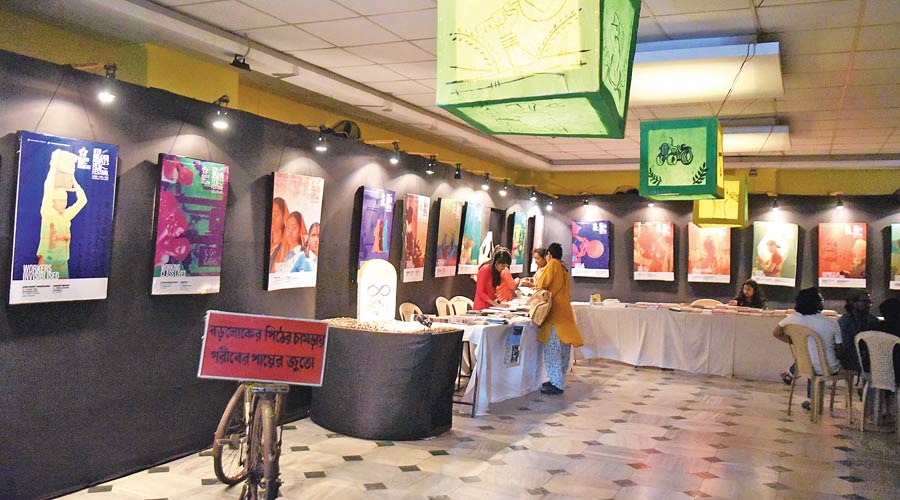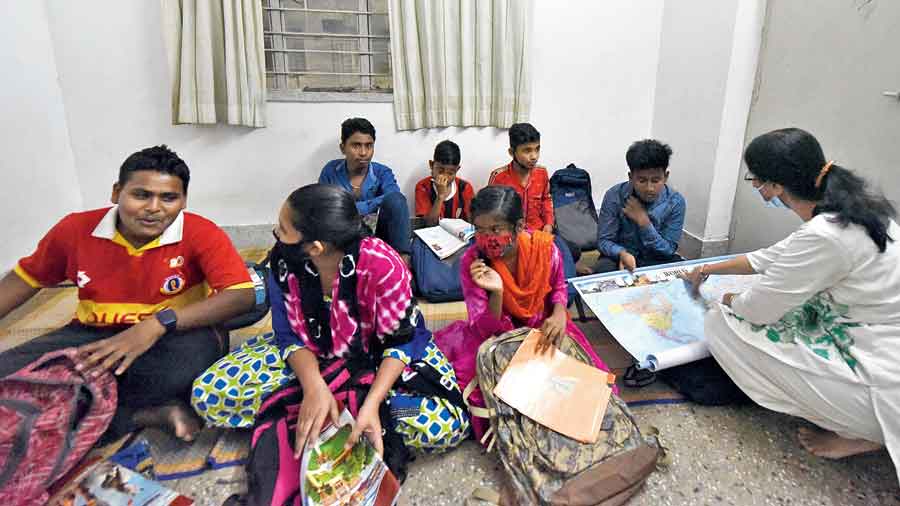A member of the Indian hockey team that won gold in the 1948 Olympics had migrated from Lahore during the Partition. When he suffered a stroke six decades later, his tenacious struggle to recover inspired his daughter to retrace his journey, which eventually led to a film.
A woman visited Kashmir in 2014, more than two decades after her family was forced to flee the state, like thousands of other Kashmiri Pandit families in the early-1990s. The visit played a catalyst to the woman’s search for her roots and identity, the subject of another film.
A third revolves around a teenage girl who excels in studies and extra-curricular activities. As soon as she gets her periods, her grandmother nags her father to find a groom for her at the earliest.
All three films, and many more, are on the screening list of a four-day film festival that started at a south Kolkata auditorium on Thursday.
The eighth edition of Kolkata People’s Film Festival, organised by the People’s Film Collective, bills itself as a “people-supported, independent, volunteer-led cinema festival” showcasing documentary and fiction cinema from India and south Asia.
The festival is back after two years.
The lobby of Uttam Mancha, the venue, is decked out with posters of the films and a series of installations on the long-standing farmers’ protest and migrant workers.
A box to receive donations from visitors is modelled on a vintage analogue movie camera. “This machine kills fascists,” reads a line on the box.
“The two years have seen deepening political fissures, widening social divides, losses in livelihoods, education, and lives. Undoing the damage, if at all possible, is a massive task and one that involves rebuilding, a restart of dialogue and gatherings,” says a note from the organisers.
The Telegraph visited Uttam Mancha on Day One of the festival.
The art
The lobby has turned into an exhibition. The message is solidarity with farmers and migrant workers.
Illuminated boxes that hang from the ceiling have symbols on them. A sickle glows on one, a plough on another and a tractor on the third.
“The struggle of migrant workers is not new. The lockdown brought it to the fore. The milestone shows that the journey is not going to end upon reaching a fixed destination. Their struggle is perennial,” said Somsankar Ray, the artist who made the installation.
The films
The film on Nandy Singh, a member of the 1948 hockey team, is titled Taangh, which means longing in Punjabi.
The 90-minute documentary, comprising archival footage and interviews with Nandy’s teammates, is the directorial debut of his daughter, Bani Singh, a designer in Bangalore.
In the trail of her father’s journey from Lahore during the Partition, Bani visited several places. Her first stop was Calcutta. She followed in the footsteps of her father, who got a job with the port trust in the city.
In Calcutta, Bani interviewed Keshav Dutt, an icon of Indian hockey and a teammate of her father.
She also visited Lahore, where she met a friend “who saved his father’s life”.
“The telling of these stories is extremely important in present times when there is a concerted attempt to revise history,” said Bani.
Another film, titled Ghar Ka Pata (Home Address), has been directed by Madhulika Jalali, who was born in Rainawari, a Srinagar suburb. She was barely six when her family had to flee Kashmir.
More than two decades later, she went back to Kashmir in 2014.
“Memories are beautiful, but I felt they were borrowed. That is when you look for home. Because it will always be your own. Growing up, I felt the absence of home much more than its presence. Three cities and six houses later, I still can't seem to settle down. Maybe this rootlessness is the curse of my exile and maybe that's why I keep searching,” she says in the film.
Her film is in contrast with another film on the same subject, The Kashmir Files, which has run into charges of fanning anti-Muslim hatred.
At several cities in India, there were reports that people from the saffron brigade shouted slogans before the end-credits of the film started rolling.
“Obviously, I don't agree with it. If I was in the theatre and if somebody was doing it, I would get up and shut that man up,” Madhulika told this newspaper over the phone.

